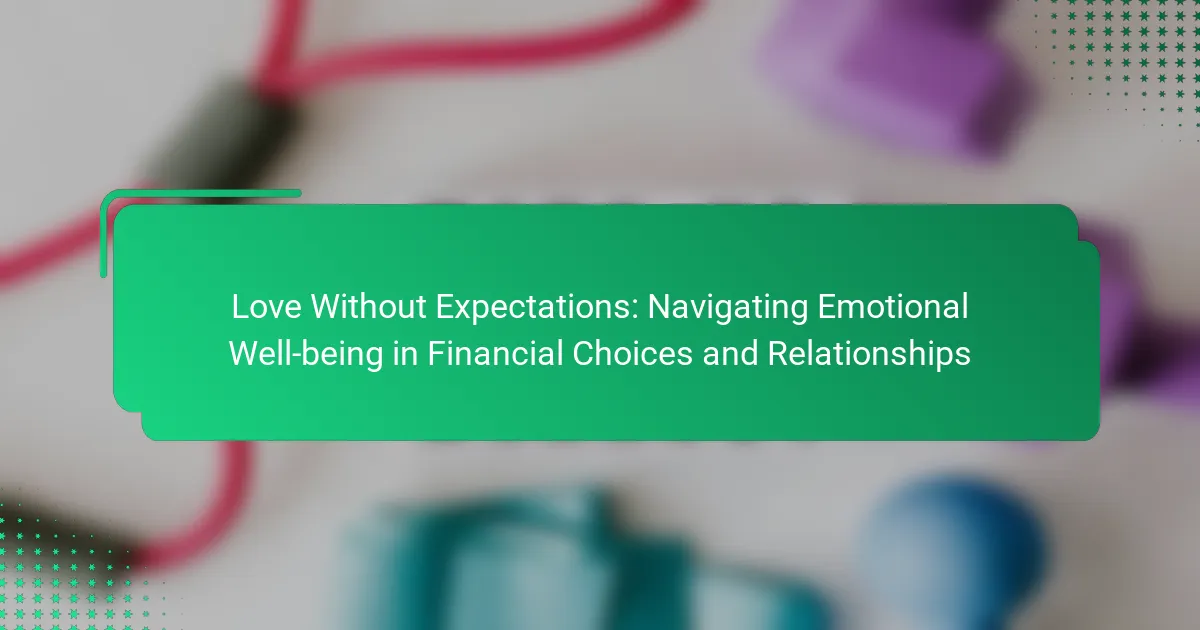Navigating financial choices within relationships can significantly impact emotional well-being. Poor financial decisions may lead to stress and conflict, while transparent discussions foster trust and satisfaction. Understanding the emotional effects of money-related decisions is essential for healthier dynamics. Prioritising open communication and shared values can enhance emotional resilience and financial stability.

How do financial decisions impact emotional well-being in relationships?
Financial decisions significantly impact emotional well-being in relationships by influencing stress levels and trust. Poor financial choices can lead to anxiety, conflict, and feelings of insecurity. Conversely, transparent financial discussions foster trust and strengthen emotional bonds. Couples who align their financial goals often experience increased satisfaction and stability, enhancing their overall relationship quality. Addressing financial matters together can mitigate misunderstandings and promote a healthier emotional environment.
What are the common emotional responses to financial stress?
Common emotional responses to financial stress include anxiety, frustration, and feelings of inadequacy. Individuals often experience heightened worry about their financial future, which can lead to irritability in relationships. As a result, stress can create tension and conflict, impacting emotional well-being. Understanding these responses is crucial for navigating financial choices and maintaining healthy relationships.
How does financial transparency affect relationship dynamics?
Financial transparency fosters trust and open communication in relationships. It reduces misunderstandings and aligns financial goals between partners. This dynamic enhances emotional well-being, as both individuals feel valued and secure. Studies show that couples who discuss finances openly report higher relationship satisfaction.
What are effective communication strategies for discussing finances?
Effective communication strategies for discussing finances include open dialogue, setting clear expectations, and active listening. Establish a safe environment that encourages honesty and transparency. Use specific examples to illustrate points, ensuring both parties understand each other’s perspectives. Regular check-ins can help maintain alignment on financial goals and responsibilities.
What role does financial security play in relationship satisfaction?
Financial security significantly enhances relationship satisfaction by reducing stress and fostering emotional stability. Couples with stable finances experience fewer conflicts, allowing for deeper emotional connections. Studies indicate that financial disagreements are a leading cause of relationship strain, underscoring the importance of economic stability. Ultimately, financial security acts as a unique attribute that contributes to overall relationship well-being.

What are the universal attributes of money-related emotional impacts?
Money-related emotional impacts universally include stress, anxiety, and relationship strain. Financial choices often influence emotional well-being, affecting personal relationships and self-esteem. Root attributes like financial security lead to positive emotions, while unique attributes such as financial stress can create negative emotional states. As a result, understanding these impacts is crucial for navigating love and financial decisions effectively.
How do shared financial goals influence relationship stability?
Shared financial goals significantly enhance relationship stability by fostering teamwork and mutual understanding. When partners align their financial objectives, they create a sense of shared purpose. This collaboration strengthens emotional bonds and reduces conflicts related to money management. Studies indicate that couples with clear, agreed-upon financial plans report higher relationship satisfaction. Additionally, transparency in financial discussions builds trust, which is a unique attribute crucial for long-term stability. As a result, couples who navigate financial choices together are more likely to maintain a healthy emotional connection.
What are the psychological effects of financial inequality in partnerships?
Financial inequality in partnerships can lead to significant psychological stress, affecting emotional well-being. Partners may experience feelings of inadequacy, resentment, or anxiety, undermining relationship stability. Research indicates that financial disparities can create power imbalances, leading to conflicts and reduced intimacy. As a result, open communication about finances is essential for fostering trust and understanding in relationships. Addressing these disparities can enhance emotional health and strengthen partnerships.

What unique attributes can enhance emotional well-being in financial decisions?
Emotional well-being in financial decisions can be enhanced by cultivating trust, empathy, and open communication. Trust fosters security, allowing individuals to make decisions without fear. Empathy helps understand emotional triggers related to finances, leading to more balanced choices. Open communication encourages transparency, reducing anxiety and fostering collaboration in financial planning. These unique attributes create a supportive environment, enhancing emotional resilience and improving overall financial well-being.
How does financial literacy contribute to healthier relationships?
Financial literacy fosters healthier relationships by promoting transparency and reducing conflict over money matters. Understanding financial principles enhances communication, enabling partners to set shared goals and make informed decisions. This alignment strengthens trust, reducing stress and emotional strain. A study found that couples with financial literacy report higher relationship satisfaction. Additionally, managing finances collaboratively can create a sense of teamwork, further solidifying emotional bonds.
What innovative budgeting methods can strengthen emotional connections?
Innovative budgeting methods can enhance emotional connections by promoting transparency and shared goals. Collaborative budgeting fosters open discussions about financial values, aligning partners’ priorities. Techniques like zero-based budgeting encourage accountability, ensuring both parties contribute to financial decisions. Regular check-ins on budget progress strengthen communication, deepening emotional bonds.
How can couples create a joint financial vision?
Couples can create a joint financial vision by openly discussing their values and goals. This process fosters alignment and understanding.
Start by identifying shared financial objectives, such as saving for a home or retirement. Establish a budget that reflects these goals, ensuring both partners contribute. Regularly review and adjust the financial plan to accommodate changes in circumstances or aspirations.
Effective communication about spending habits and financial priorities builds trust. Consider seeking professional guidance for complex situations. This collaborative approach strengthens both the financial and emotional aspects of the relationship.

What are the rare attributes that influence financial decision-making in love?
Cultural beliefs and personal values are rare attributes that significantly influence financial decision-making in love. These factors shape how individuals perceive money and relationships, impacting choices related to spending, saving, and sharing resources with partners. Understanding these influences can enhance emotional well-being and foster healthier financial dynamics in relationships.
How do cultural perspectives on money shape relationship dynamics?
Cultural perspectives on money significantly influence relationship dynamics by shaping expectations and communication styles. Different cultures prioritise financial stability, spending habits, and shared financial goals, which can create tension or harmony in relationships. For instance, collectivist cultures may emphasise shared resources, fostering collaboration, while individualistic cultures might focus on personal financial independence, leading to conflicts over financial decisions. Understanding these cultural differences can enhance emotional well-being, promoting healthier interactions and reducing stress related to financial choices.
What impact do life transitions have on financial decision-making in relationships?
Life transitions significantly influence financial decision-making in relationships by altering priorities and emotional dynamics. Major life changes, such as marriage, parenthood, or job loss, can shift financial goals and spending habits. For instance, couples may prioritise saving for a home or education during these transitions. Additionally, emotional well-being affects financial choices; stress or anxiety can lead to impulsive spending or avoidance of financial discussions. Open communication about financial expectations during transitions fosters healthier decision-making and strengthens the relationship.

What are best practices for maintaining emotional well-being in financial choices?
To maintain emotional well-being in financial choices, prioritise open communication and set clear boundaries in relationships. Establish a budget that reflects shared values and goals, ensuring both partners feel secure. Regularly assess financial decisions together to foster trust and alignment. Practise gratitude and celebrate financial milestones, reinforcing positive emotional connections.
How can couples navigate financial disagreements effectively?
Couples can navigate financial disagreements effectively by fostering open communication and establishing shared goals. Regular discussions about finances promote transparency and mutual understanding. Setting a budget together can align priorities and reduce conflicts. Establishing individual spending limits respects personal autonomy while maintaining accountability. Seeking professional guidance can provide neutral perspectives on complex issues.
What are common mistakes to avoid in financial discussions?
Common mistakes in financial discussions include avoiding transparency, neglecting emotional factors, and failing to set clear expectations. These errors can lead to misunderstandings and conflict in relationships. Open communication fosters trust and aligns financial goals. Additionally, overlooking individual financial habits may skew perspectives, impacting decision-making. Prioritising empathy and understanding can enhance emotional well-being in financial choices.
What expert insights can guide healthier financial decision-making in love?
To make healthier financial decisions in love, prioritise open communication and shared goals. Discuss financial values early to align expectations. Establish a budget together, focusing on mutual needs and desires. Regularly reassess financial plans to adapt to changing circumstances. This collaborative approach fosters trust and emotional well-being.


